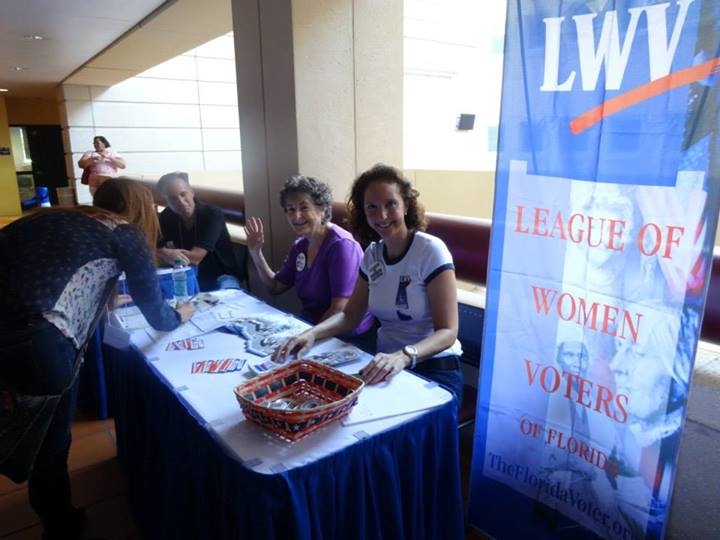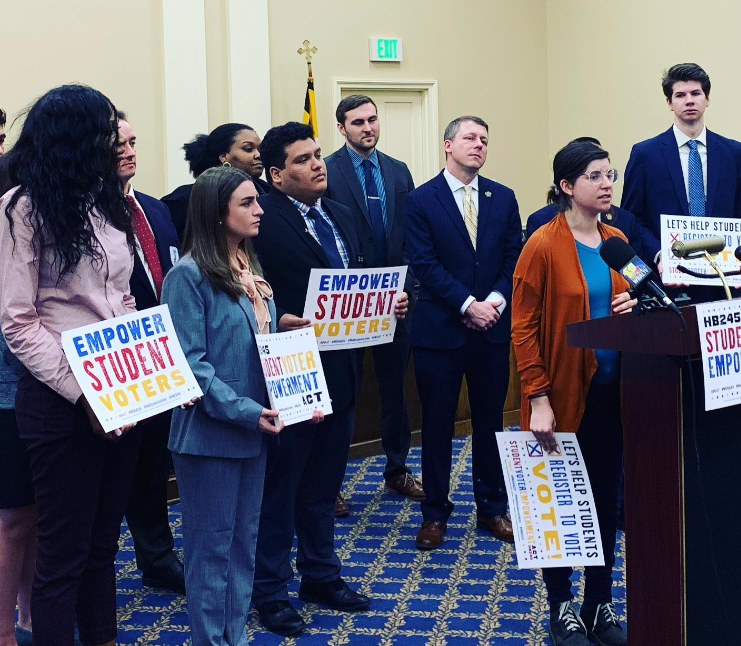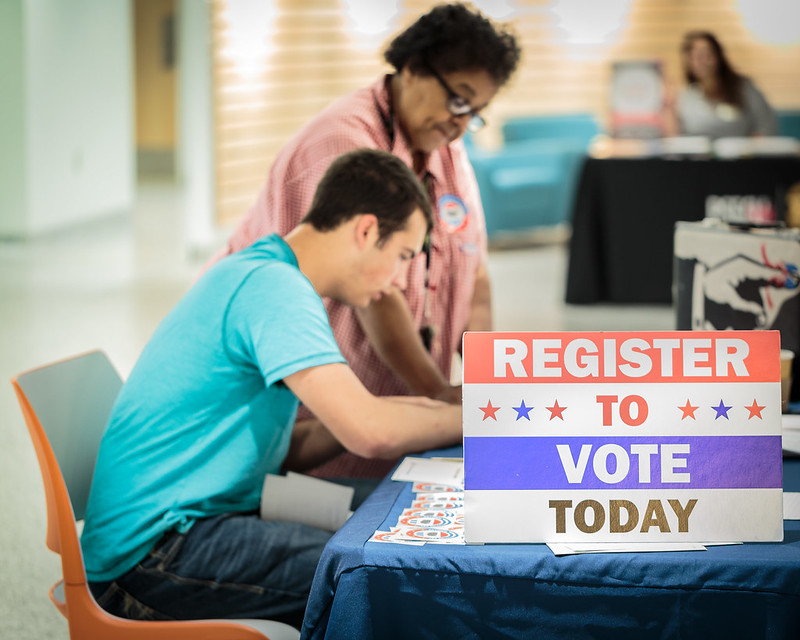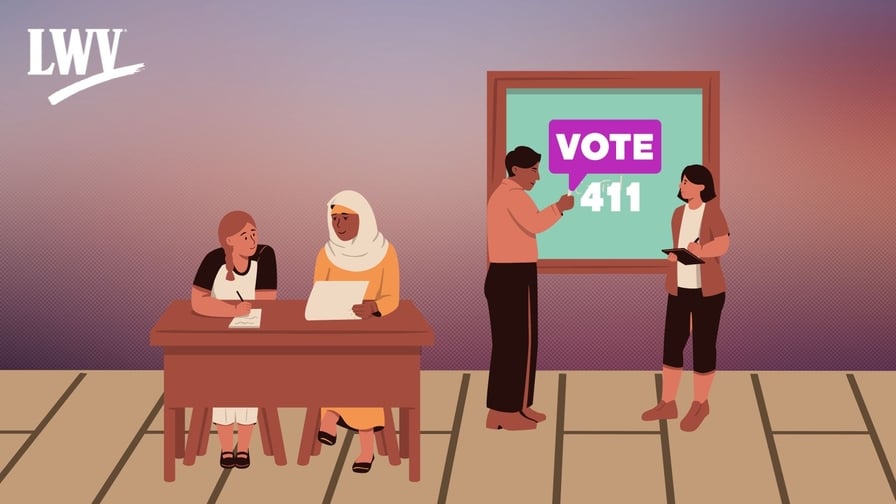Leagues Working for Civics Education
Civics education is integral to the future of our democracy.
Over 20 years ago, the League of Women Voters launched Making Democracy Work®, a campaign focusing on five key indicators of a healthy democracy. Two of these indicators are civic education and civic participation — because, as a nonpartisan voting rights and democracy policy organization, the League knows civic information and involvement are key to a healthy American democracy.
At the federal level, LWVUS supports the funding of civic education and educates Congress about its importance. There is even more incredible work conducted by state and local Leagues across the country to support civic education; last year, 63% of Leagues who completed an annual survey indicated that Civic Education is a “current priority” for them.
LWVUS decided to delve more into the stories behind the data and learn from a handful of Leagues about their work and motivation to bring better civic engagement to their communities. Many Leagues highlighted similar motivations to lean into this work; for example, there are real, measurable disparities between federal investment in civics education and other areas of study, like STEM (science, technology, engineering, and math) education. The federal government spends $50 per student per year on STEM education and only five cents per student per year on civics. This is especially concerning to Leagues because of the strong connection between civically educated voters and a representative, engaged democracy.
Below are just a few stories from states across the country about the importance of civic engagement and the work that they are doing to promote it.
Florida
Cecile Scoon is a private practice civil rights attorney and president of the League of Women Voters of Florida (LWVFL). To best understand the civics work happening in Florida, Cecile stresses the historical context and factors that impact civic engagement in the state.
People of color, especially Black people, have been ostracized from the political process. As a result, individuals in these communities often do not feel welcome to engage in civic processes like holding meetings with the mayor or going to community events.

Historically, many people of color have had to be cautious about engaging politically. Cecile notes, "For the generation before us, it could have cost them their lives.”
“So, we're trying to really encourage people to engage much more directly," Cecile says. "For the last three or four years, we've been doing a lot more education with regards to canvassing.”
Often, when we think about civics work, it’s about K-12 education. "Schools are being bombarded with so much right now in Florida” between gun safety, LGBTQ rights and education, and school curriculums — especially around history. These conversations are taking up a lot of attention and can overshadow advocates’ work supporting civics education.
LWVFL has found other ways to reach students with civic education, partnering with youth-focused organizations and conducting multi-generational community outreach to help folks become civically engaged. They recently started “Community Conversations,” a forum in which people from multiple points of view come together to advocate for their positions civilly. “People select questions and speaking order from a hat. We don't know who's going to get what question. We've had one very successful event, and we're going to have more this year on the restoration of voting rights and higher education.”
To advocate for civics education and participation in your community, join one of the 700+ state and local Leagues.
The Florida League’s creativity has reaped meaningful rewards. Their membership has increased 12% over the past two years, and they’ve invested very intentionally to continue that growth. LWVFL leadership believes that relational outreach and leveraging their strengths in their membership and leadership diversity have been major drivers in their success. “I live in a very small little town. Being from here is everything. And being a well-known and trusted source is everything.”
Maine
The League of Maine (LWVME) believes the lack of funding for civics education is a root cause for low voter participation in the US. They point to a recent study of comparable democratic countries in which our nation's voting participation rate was ranked 31st out of 49. To encourage more voter participation and strengthen our democracy, LWVME prioritizes preparing citizens with the knowledge and skills to vote. This education starts in schools, with age-appropriate civic education spanning a student’s education. LWVME feels that civics education for students and young voters positively impacts the civic engagement of future voters and their families.
LWVME’s civic education volunteer team is advocating for improved civic education and developing an easy-to-use, Maine-based curriculum for teachers. They previously worked in close connection to a member of the state House of Representatives to introduce a civic education bill, but the debate around the contents of the bill stalled its progress before it reached a committee vote. This sparked the volunteer team to start analyzing the state of civics education statewide. Their process will include research, interviews with teachers and students, and member education, culminating in a list of recommendations for a civics bill next session.
Maryland
The Maryland Legislature recently passed a law requiring all 44 institutions of higher education in the state to develop a voter engagement plan and connect with their local Boards of Elections. This has inspired a number of Leagues in the state to build stronger relationships with colleges, hosting voter registration drives, developing college-focused "how to vote" guides, and participating in civic events on campuses.

As the state League, the League of Women Voters of Maryland (LWVMD) has worked to support the growth of local Leagues’ civics efforts. For example, LWV of Montgomery County has a thriving civics initiative in high schools, community colleges, and among their own members. Other Leagues are rebuilding and expanding their efforts to support voter registration, connect with civic scholars and educators, and engage in community discussions.
LWVMD also supports legislation like SB 271, which would empower local schools to establish a seal of civic excellence for high school. LWVMD’s coalition partners annually host the Maryland Civic Education & Engagement Leadership Summit in April to bring together people from all walks of life, including researchers, students, civic leaders, policymakers, teachers, and many others, to collaborate on this project.
Maryland doesn't require that students take civics courses, but every educator plays a role in shaping the future of our democracy and empowering young people to engage effectively in public life. LWVMD hopes to build on the idea that democracy solves many of our problems.
Minnesota
Lisa Larson, a League member who served as counsel to the Minnesota House Education Committee, recently testified in support of a state bill that would implement a civics education course as a requirement for high school graduation (SF 618). She stated that “civics education is key to both the purpose and mission of the League of Women Voters,” adding that “League members believe democracy depends on informed citizens who actively and effectively participate in their government.”
The League of Women Voters of Minnesota (LWVMN) supports this civics course requirement because, currently, the civics curriculum — if one is provided at all — varies between districts statewide. Students are not guaranteed to receive state government or citizenship content in the classroom, and even if they do, it is not necessarily provided in a separate civics course.
LWVMN strongly believes that democracy is not self-sustaining. Additionally, LWVMN highlights that civics is not history and is thereby not “covered” by history courses. Equipped with a comprehensive education in both subjects, students will be able to use civic knowledge as the application of democratic processes in their day-to-day life. They will use knowledge of history to contextualize our current democratic process and its origins.
LWVMN not only advocates for stronger civic education in high schools through testimonies like Larson’s but also takes their commitment to civically engaged youth a step further by pre-registering student voters, ensuring their readiness to vote when they reach the eligible age.
Pennsylvania
In Pennsylvania, elections happen every year — twice a year, when you count primaries. These elections can get confusing, as there are different county structures in the 67 counties in Pennsylvania.

So, voter education is key, says Rochelle Kaplan of the League of Pennsylvania (LWVPA). Ballot Box Basics is the name of a webinar program by LWVPA to help voters understand the workings of Pennsylvania elections. The content they share with voters across the state covers:
-
How to register to vote:
-
How to get a mail-in ballot;
-
Which candidates and ballot initiatives voters should see on their ballot;
-
School board elections;
-
And more!
Additionally, voters have received helpful information from these forums on government offices from the county to township levels — what they do, how they interact, and what their roles and responsibilities are.
Pennsylvania is one of only a handful of states that have closed primaries, which means that during primary elections, voters who are not registered with a given party cannot vote in their primary election. LWVPA seeks to educate voters on these elements of Pennsylvania’s primary system to help them participate in the electoral process and empower them to advocate against the closed primary system as a form of voter suppression.
Civics education — both for students and adults — is a high priority for LWVPA. Voter education is critical to empowering voters to turn out in elections. Rochelle says that a commonly reported concern among eligible voters who don’t cast their ballots is that they don’t understand the issues or where candidates fall on them. LWVPA plans to continue to respond to voter needs by providing educational content on specific voting topics to help increase turnout at the polls.
Please consider working with your local League to support civics education work in your community. If you are already active with your League and interested in working with LWVUS to learn more about supporting civics education, you can join an office hours call to ask questions. If you want to learn more about LWVUS’ civics coalition partners at the federal level and our work, please see iCivics and the CivXNow coalitions’ webpages.
We would like to sincerely thank the Leagues who shared their stories! Special thanks to Cecile Scoon of LWVFL, Allyson Gardner of LWVME, Genie Massey of LWVMD, Sam Streukens and Lisa Larson of LWVMN, and Rochelle Kaplan of LWVPA for their work in sharing these stories.
We look forward to continuing this conversation with even more League members. Please feel free to connect with us via Kristen Kern at [email protected] if your League would like to share more about the civics work at your level of government.
The Latest from the League
Civics and democracy are integrally linked. An informed and civically knowledgeable population can work together to achieve a more fair society and confidently lead the future of our democracy. Offering civics education at all levels is essential to fulfilling our obligation to secure our democracy.
PROVIDENCE — Last week, litigation filed by Rhode Island students seeking to establish a constitutional right to a civics education ended with an agreement that both sides agree will strengthen civics education in the state. The League of Women Voters of the United States and the League of Women Voters of Rhode Island filed an amicus brief in the case — Cook v. McKee — highlighting the powerful connection between civics education and voter participation.
All year long, I work with League volunteers around the country, supporting their efforts to reach and help inform voters through our national voter information site, VOTE411.org.
Sign Up For Email
Keep up with the League. Receive emails to your inbox!
Donate to support our work
to empower voters and defend democracy.





